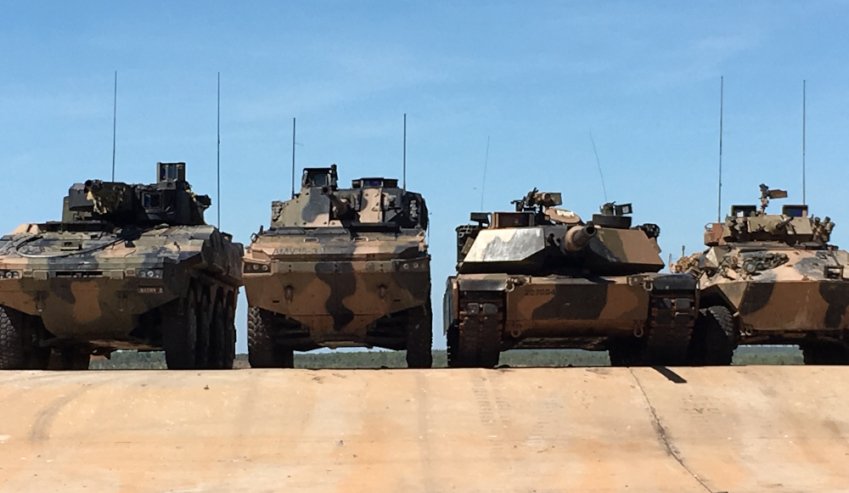Defence procurement projects that are seeing states go head-to-head to secure work from the federal government, including LAND 400 Phase 2, has been labelled destructive by Gerard Wheeler, head of public affairs for Raytheon Australia, at a parliamentary hearing.
To continue reading the rest of this article, please log in.
Create free account to get unlimited news articles and more!
Speaking at the inquiry into the benefits and risks of a Bipartisan Australian Defence Agreement, Wheeler said that while Raytheon Australia is not in support of the bipartisan agreement that has been put forward, a better arrangement needs to be reached between the states and territories.
"There is one area of public dialogue on defence capability where greater bipartisanship needs to be achieved and that is between the various Australian states," said Wheeler.
"Few could deny that the level of rivalry between the states for defence work has become almost hysterical if not destructive."
Wheeler touched on the support the company has given to South Australia in its endeavour to establish a local defence industry capability, but criticised other states for pushing a local agenda to secure projects with potential disregard for the national interest.
"Raytheon has been pleased to support a state such as South Australia where successive Liberal and Labor governments have worked assiduously over the course of the past two decades to invest in defence infrastructure and to establish a local defence industry capability that can be at the heart of the Commonwealth's industrial strategy," he said.
"What has got completely out of hand is the way some other states have used parochial local media to prosecute their own individual cases to win federal government work with scant regard to any national interest. On occasions this has appeared to crowd out both the interests and other states and a proper consideration of the individual capabilities the Commonwealth may be seeking to acquire."
Wheeler made reference to the LAND 400 Phase 2 project, a project worth up $5 billion, which has heated up in the last few weeks, with accusations rife that the project will come down to pork-barrelling in marginal seats.
Federal ministers Alan Tudge, Tim Wilson, Chris Crewther, Michael Sukkar, Kevin Andrews and senator Jane Hume converged on RUAG Australia's office at Bayswater for the announcement that, should BAE Systems secure the project, RUAG Australia will produce world-leading ballistic armour for the 225 Australian Army combat reconnaissance vehicles (CRVs).
A new campaign by the state's Labor government was also launched recently, which includes billboards throughout Canberra aiming to promote the strengths of Victoria’s defence industry and record in manufacturing military vehicles.
Wheeler is not alone in calling for changes to the current defence procurement dynamics. Last year, the NSW Legislative Council’s standing committee on state development has heard from the chief executives of Thales Australia who stressed that the current process is seeing taxpayer funds wasted.
Chris Jenkins, CEO of Thales Australia, argued that the current state of things will see more 'valleys of death' created if project decisions are made in favour of state-backed funds and investment rather than sustainable decisions.
"Businesses need to be sustainable for the long-term on their own merits, and our businesses look at the long-term business case and work out: does it make sense to establish, in the case of that LAND 400 project, a build facility that will set up a project for a period of time and then that project will end and then what will be left? In the shipbuilding sector it was called the valley of death for a period of time where projects came, projects went and there was an aftermath," Jenkins explained.
"Projects need to be in the context of a sustainable business enterprise ... The only support that we would seek from the New South Wales government – we are not asking for any money; that is not the point, but what we do think, though, is that it is very important for New South Wales to be on the front foot in ensuring that this national enterprise of things like submarines and Future Frigates is not just focusing on South Australia where the ship gets built; it is all of the knowledge that Australia has, all of the engineers that are coming through university today or kids that have not even thought to be engineers and encouraging them to be part of that future workforce that will not only create the system in the first instance but make sure it stays at the cutting-edge of performance right through the life of that ship, which could be 40 or 50 years."
Victoria's defence industry advocate and former parliamentary secretary for defence procurement Greg Combet also labelled the state v state bidding model as “less than optimal” during a Defence Connect podcast.
"There's no working together on LAND 400, and largely because of the way the procurement has been conducted by the Commonwealth. The states were essentially invited to compete and to treat with the bidders to try and attract them and that's led to a less than optimal economic outcome, in my opinion," said Combet.
"I've got a funny, I suppose, background for this because having been a Commonwealth government defence procurement minister, I know how inefficient it is to have the states competing in this way."
The former politician said the process was a way for the federal government to pass on infrastructure costs to the winning state.
"What it is is a cost transfer from the Commonwealth to the states. Instead of picking up any of the tab for the infrastructure, for example, Defence shifts all of that to the states who are out there competing amongst each other," Combet said.
"And the extent to which prime contractors then discount their tender price for the infrastructure that's laid on and the cash incentives that's laid on by the states, is moot, I think. And that's a less than optimal outcome for taxpayers."

 Login
Login







